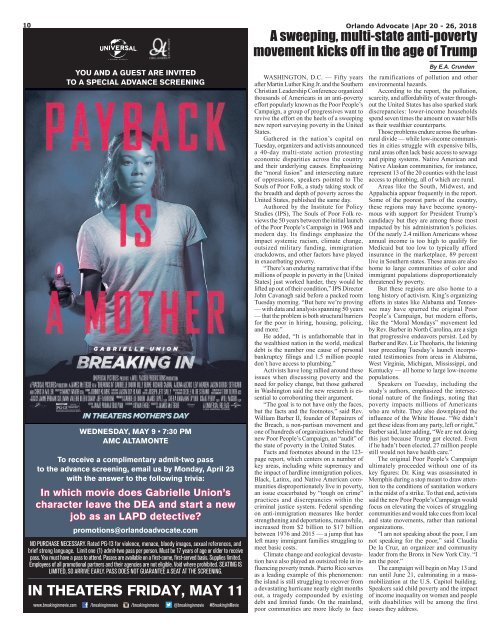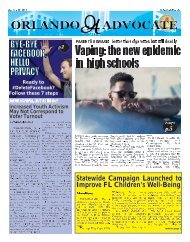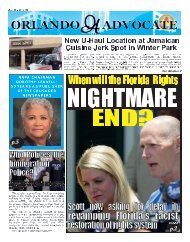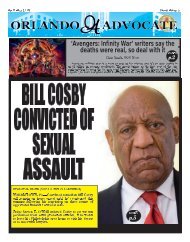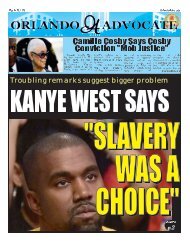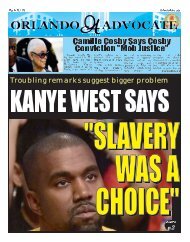2018-04-20
Create successful ePaper yourself
Turn your PDF publications into a flip-book with our unique Google optimized e-Paper software.
10<br />
YOU AND A GUEST ARE INVITED<br />
TO A SPECIAL ADVANCE SCREENING<br />
NO PURCHASE NECESSARY. Rated PG-13 for violence, menace, bloody images, sexual references, and<br />
brief strong language. Limit one (1) admit-two pass per person. Must be 17 years of age or older to receive<br />
pass. You must have a pass to attend. Passes are available on a first-come, first-served basis. Supplies limited.<br />
Employees of all promotional partners and their agencies are not eligible. Void where prohibited. SEATING IS<br />
LIMITED, SO ARRIVE EARLY. PASS DOES NOT GUARANTEE A SEAT AT THE SCREENING.<br />
IN THEATERS FRIDAY, MAY 11<br />
www.breakinginmovie.com<br />
WEDNESDAY, MAY 9 • 7:30 PM<br />
AMC ALTAMONTE<br />
To receive a complimentary admit-two pass<br />
to the advance screening, email us by Monday, April 23<br />
with the answer to the following trivia:<br />
In which movie does Gabrielle Union’s<br />
character leave the DEA and start a new<br />
job as an LAPD detective?<br />
promotions@orlandoadvocate.com<br />
/breakinginmovie<br />
/breakinginmovie<br />
@breakinginmovie<br />
#BreakingInMovie<br />
WASHINGTON, D.C. — Fifty years<br />
after Martin Luther King Jr. and the Southern<br />
Christian Leadership Conference organized<br />
thousands of Americans in an anti-poverty<br />
effort popularly known as the Poor People’s<br />
Campaign, a group of progressives want to<br />
revive the effort on the heels of a sweeping<br />
new report surveying poverty in the United<br />
States.<br />
Gathered in the nation’s capital on<br />
Tuesday, organizers and activists announced<br />
a 40-day multi-state action protesting<br />
economic disparities across the country<br />
and their underlying causes. Emphasizing<br />
the “moral fusion” and intersecting nature<br />
of oppressions, speakers pointed to The<br />
Souls of Poor Folk, a study taking stock of<br />
the breadth and depth of poverty across the<br />
United States, published the same day.<br />
Authored by the Institute for Policy<br />
Studies (IPS), The Souls of Poor Folk reviews<br />
the 50 years between the initial launch<br />
of the Poor People’s Campaign in 1968 and<br />
modern day. Its findings emphasize the<br />
impact systemic racism, climate change,<br />
outsized military funding, immigration<br />
crackdowns, and other factors have played<br />
in exacerbating poverty.<br />
“There’s an enduring narrative that if the<br />
millions of people in poverty in the [United<br />
States] just worked harder, they would be<br />
lifted up out of their condition,” IPS Director<br />
John Cavanagh said before a packed room<br />
Tuesday morning. “But here we’re proving<br />
— with data and analysis spanning 50 years<br />
— that the problem is both structural barriers<br />
for the poor in hiring, housing, policing,<br />
and more.”<br />
He added, “It is unfathomable that in<br />
the wealthiest nation in the world, medical<br />
debt is the number one cause of personal<br />
bankruptcy filings and 1.5 million people<br />
don’t have access to plumbing.”<br />
Activists have long rallied around these<br />
issues when discussing poverty and the<br />
need for policy change, but those gathered<br />
in Washington said the new research is essential<br />
to corroborating their argument.<br />
“The goal is to not have only the faces,<br />
but the facts and the footnotes,” said Rev.<br />
William Barber II, founder of Repairers of<br />
the Breach, a non-partisan movement and<br />
one of hundreds of organizations behind the<br />
new Poor People’s Campaign, an “audit” of<br />
the state of poverty in the United States.<br />
Facts and footnotes abound in the 123-<br />
page report, which centers on a number of<br />
key areas, including white supremacy and<br />
the impact of hardline immigration polices.<br />
Black, Latinx, and Native American communities<br />
disproportionately live in poverty,<br />
an issue exacerbated by “tough on crime”<br />
practices and discrepancies within the<br />
criminal justice system. Federal spending<br />
on anti-immigration measures like border<br />
strengthening and deportations, meanwhile,<br />
increased from $2 billion to $17 billion<br />
between 1976 and <strong>20</strong>15 — a jump that has<br />
left many immigrant families struggling to<br />
meet basic costs.<br />
Climate change and ecological devastation<br />
have also played an outsized role in influencing<br />
poverty trends. Puerto Rico serves<br />
as a leading example of this phenomenon:<br />
the island is still struggling to recover from<br />
a devastating hurricane nearly eight months<br />
out, a tragedy compounded by existing<br />
debt and limited funds. On the mainland,<br />
poor communities are more likely to face<br />
Orlando Advocate |Apr <strong>20</strong> - 26, <strong><strong>20</strong>18</strong><br />
A sweeping, multi-state anti-poverty<br />
movement kicks off in the age of Trump<br />
By E.A. Crunden<br />
the ramifications of pollution and other<br />
environmental hazards.<br />
According to the report, the pollution,<br />
scarcity, and affordability of water throughout<br />
the United States has also sparked stark<br />
discrepancies: lower-income households<br />
spend seven times the amount on water bills<br />
as their wealthier counterparts.<br />
Those problems endure across the urbanrural<br />
divide — while low-income communities<br />
in cities struggle with expensive bills,<br />
rural areas often lack basic access to sewage<br />
and piping systems. Native American and<br />
Native Alaskan communities, for instance,<br />
represent 13 of the <strong>20</strong> counties with the least<br />
access to plumbing, all of which are rural.<br />
Areas like the South, Midwest, and<br />
Appalachia appear frequently in the report.<br />
Some of the poorest parts of the country,<br />
these regions may have become synonymous<br />
with support for President Trump’s<br />
candidacy but they are among those most<br />
impacted by his administration’s policies.<br />
Of the nearly 2.4 million Americans whose<br />
annual income is too high to qualify for<br />
Medicaid but too low to typically afford<br />
insurance in the marketplace, 89 percent<br />
live in Southern states. These areas are also<br />
home to large communities of color and<br />
immigrant populations disproportionately<br />
threatened by poverty.<br />
But these regions are also home to a<br />
long history of activism. King’s organizing<br />
efforts in states like Alabama and Tennessee<br />
may have spurred the original Poor<br />
People’s Campaign, but modern efforts,<br />
like the “Moral Mondays” movement led<br />
by Rev. Barber in North Carolina, are a sign<br />
that progressive endeavors persist. Led by<br />
Barber and Rev. Liz Theoharis, the listening<br />
tour preceding Tuesday’s launch incorporated<br />
testimonies from areas in Alabama,<br />
West Virginia, Michigan, Mississippi, and<br />
Kentucky — all home to large low-income<br />
populations.<br />
Speakers on Tuesday, including the<br />
study’s authors, emphasized the intersectional<br />
nature of the findings, noting that<br />
poverty impacts millions of Americans<br />
who are white. They also downplayed the<br />
influence of the White House. “We didn’t<br />
get these ideas from any party, left or right,”<br />
Barber said, later adding, “We are not doing<br />
this just because Trump got elected. Even<br />
if he hadn’t been elected, 27 million people<br />
still would not have health care.”<br />
The original Poor People’s Campaign<br />
ultimately proceeded without one of its<br />
key figures: Dr. King was assassinated in<br />
Memphis during a stop meant to draw attention<br />
to the conditions of sanitation workers<br />
in the midst of a strike. To that end, activists<br />
said the new Poor People’s Campaign would<br />
focus on elevating the voices of struggling<br />
communities and would take cues from local<br />
and state movements, rather than national<br />
organizations.<br />
“I am not speaking about the poor, I am<br />
not speaking for the poor,” said Claudia<br />
De la Cruz, an organizer and community<br />
leader from the Bronx in New York City. “I<br />
am the poor.”<br />
The campaign will begin on May 13 and<br />
run until June 21, culminating in a massmobilization<br />
at the U.S. Capitol building.<br />
Speakers said child poverty and the impact<br />
of income inequality on women and people<br />
with disabilities will be among the first<br />
issues they address.


